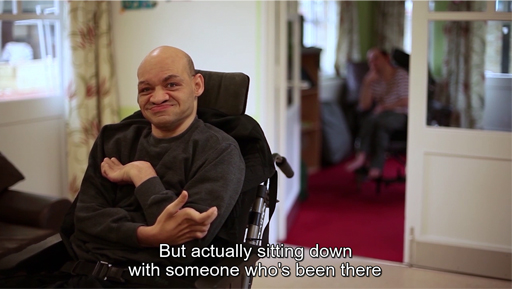4 Listening to people who do not use words to communicate
Three of the people you met in Video 2 in Section 1 – Shaun, Cian and Dayo – would be labelled as having mild or moderate learning disabilities. They can lead their lives with some support from their families, friends or paid staff. They also have views on what they want their lives to be like, and can share them.
However, people with profound or severe learning disabilities cannot communicate as directly. Finding out what support they need to enjoy life requires imagination and empathy. Watch this short clip of Ronke, a support worker, who explains how she found out that her ‘client’ loves to invite members of her family to Sunday lunch.

Transcript: Video 3
Were you impressed with the way Ronke pieced together little bits of information to find a way to make her ‘client’ happy?
In the next activity, you will try using your own imagination and empathy to work out how to ‘listen’ to people who do not use words to communicate.
Activity 3 Listening to people who do not use words
Video 4 shows short clips of people who do not use words to communicate.
As you watch it, note down three things you could try to help you find out what they enjoy doing.

Transcript: Video 4
Answer
Here are some ways you could find out more about the people you met in the video.
- Spend time with them at different times of the day.
- Try lots of different experiences and observe how they respond.
- Find out from people who know them well what they enjoy doing and who they like to spend time with.
Clare, whose daughter Elinor appeared near the end of Video 4, explains how she found out what Elinor likes doing.
Elinor loves doing lots of things – music, gigs, swimming, food. How do we know? By her behaviour and responses. By the sensual delight she takes in the feel of water in the swimming pool. By her smiles when songs she likes are played. She gives us clear messages.
In the next section you will think more about how the lives of people with severe or profound learning disabilities can be improved.
